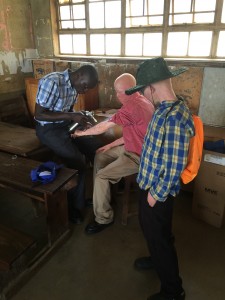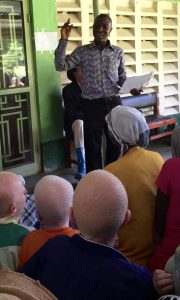
Dr. Kennie performs cryosurgery on a young man with albinism.
Update: Our next set of mobile clinics is scheduled for December 2017, and we hope to expand to an additional region.
People with albinism in East Africa face profound social stigma and isolation, due to the negative myths that surround the condition. In addition, most children with albinism have early signs of skin cancer by their teen years, and only 2% of people with albinism live to reach their 40th birthday. As a result, a lack of understanding about albinism can certainly be fatal.
Our awareness initiatives have three focuses: to teach people with albinism how to reduce skin cancer; to give people with albinism and their families a basic understanding of the condition; and to eliminate the myths surrounding albinism. We organize “Albinism Awareness Days” in rural areas; sponsor dermatology clinics; produce informational radio programming; and teach one-on-one self-care skills to adults and kids with albinism.
Sun Safety and Skin Cancer Treatment
One of the most important aspects of our work is to teach people with albinism and their families about how to stay safe in the sun. Many people with albinism and their families do not understand the link between sun exposure and cancer. Thus, it is critical to teach people that simple precautions like wearing long sleeves and hats can dramatically reduce the incidence of skin cancer.
We are mindful that most people in East Africa must work outside to survive, and we stress that farming is a viable option for people with albinism. However, we explain that they should seek shade whenever possible, wear protective clothing and minimize their exposure during the brightest parts of the day.
Sunscreen, while not widely available, is another important tool to explain and demonstrate. On a recent trip to Tanzania, Asante Mariamu volunteers learned that mothers were applying sunscreen to their children at night, like a lotion. While we prefer to focus on more sustainable methods of sun protection, we teach families how to properly apply sunscreen.

Dr. Harry gives a lesson on skin protection and cancer prevention.
We work with local dermatologists to provide skin cancer screenings and treatment. In the last two years, we have organized 10 mobile clinics in rural Uganda, educating approximately 1500 people and performing surgery on close to 200 patients.